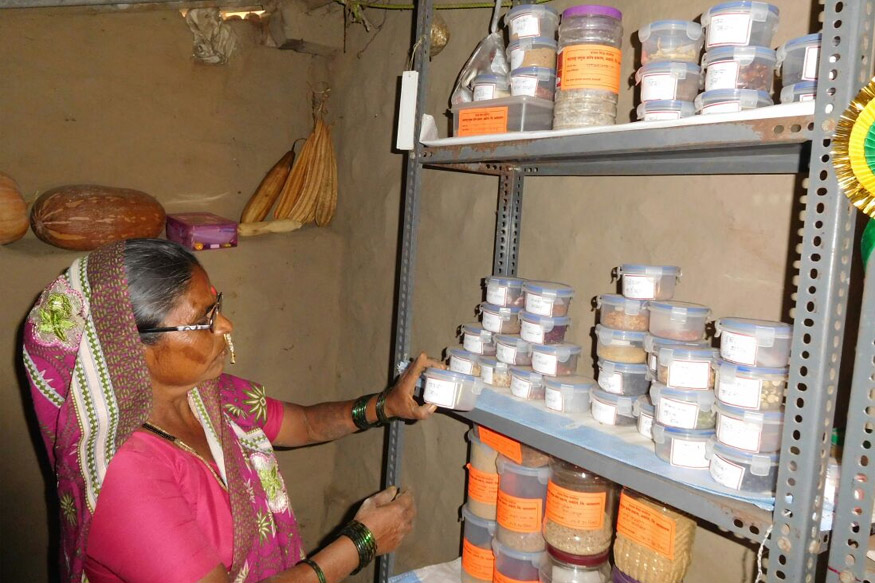"Dream, Dream, Dream! Conduct these dreams into thoughts, and then transform them into action."
- Dr. A. P. J. Abdul Kalam
"Dream, Dream, Dream! Conduct these dreams into thoughts, and then transform them into action."
- Dr. A. P. J. Abdul Kalam
3 Oct 2024
Navratri, a nine-day festival dedicated to the goddess Durga and her many forms, is more than just a religious celebration. It represents a seasonal turning point that brings together agriculture, food security, and cultural traditions. While the festival is celebrated with prayers, fasting, and devotion, it also coincides with the harvest season, making it a time to honor the Earth and express gratitude for the abundance of crops. During this period of transition from the Kharif to Rabi cropping season, Navratri serves as a reminder of the delicate balance between human sustenance and the natural environment.
This deep connection between agriculture and tradition is personified in the work of Rahibai Popere. Known as "India's Seed Mother," Popere has dedicated her life to preserving indigenous seed varieties, ensuring that future generations have access to diverse and resilient crops. Her work resonates with the values of Navratri—renewal, respect for nature, and sustainable prosperity.
Rahibai Popere, hailing from the small tribal village of Kombhalne in Maharashtra, has been at the forefront of preserving India's agricultural biodiversity. In a world increasingly dominated by hybrid seeds and chemically dependent crops, Popere has championed the conservation of 154 indigenous seed varieties, including traditional rice, millets, and jowar (sorghum).

Popere's journey began when she noticed a rise in malnutrition and illness among children in her village.
“My grandchildren used to fall ill. There were malnourished children around me, which was never the case before. I realized this was happening because we were using too many pesticides and chemical fertilizers,”
Determined to bring about change, Popere started collecting indigenous seeds and promoting traditional, organic methods of farming.
"My father used to say, 'Old is gold,' and that inspired me to preserve the old varieties of seeds," she recalls. Despite initial resistance from her community, Popere persisted, and over time, her work garnered attention from neighboring villages and agricultural experts.
Navratri, with its focus on renewal and respect for the Earth, mirrors Rahibai Popere's efforts to revive indigenous farming. Just as the festival honors the goddess Durga's nurturing and protective qualities, Popere's work reflects a commitment to safeguarding Mother Earth and her resources. She has tirelessly educated farmers on the benefits of native crops, explaining how these resilient varieties need less water and can thrive without harmful chemicals.

Her dedication has not only ensured food security for her village but also created a ripple effect across regions. Today, she trains farmers, shares her seeds, and promotes the use of traditional crops that are vital in the face of climate change and fluctuating rainfall patterns.
Some of the varieties she has conserved, such as Raibhog and Kolpi rice, are known for their resilience in the face of adverse weather conditions, while Hyacinth bean varieties like Kadu Wal can grow on residual moisture. These crops are crucial in regions like Maharashtra, where uneven rainfall can make farming a precarious venture.
Popere’s work has also given rise to a seed bank, where she stores and shares seeds with farmers across seven villages in the Akole block of Ahmednagar district. This grassroots movement is not just about crop preservation—it's about empowering farmers to reclaim control over their food systems and reduce dependence on commercial seed companies.
)
Popere’s philosophy resonates deeply with the symbolism of Navratri. As people pray for prosperity and abundance during the festival, Popere is working to ensure that these prayers are answered by maintaining biodiversity, enriching the soil, and promoting sustainable farming techniques.
Navratri, with its cultural and agricultural importance, serves as a period of reflection on our relationship with nature. It is a time to honor the Earth, celebrate her bounty, and pledge to protect her for the future. Rahibai Popere's work exemplifies this spirit, as she tirelessly works to preserve the seeds that sustain life.